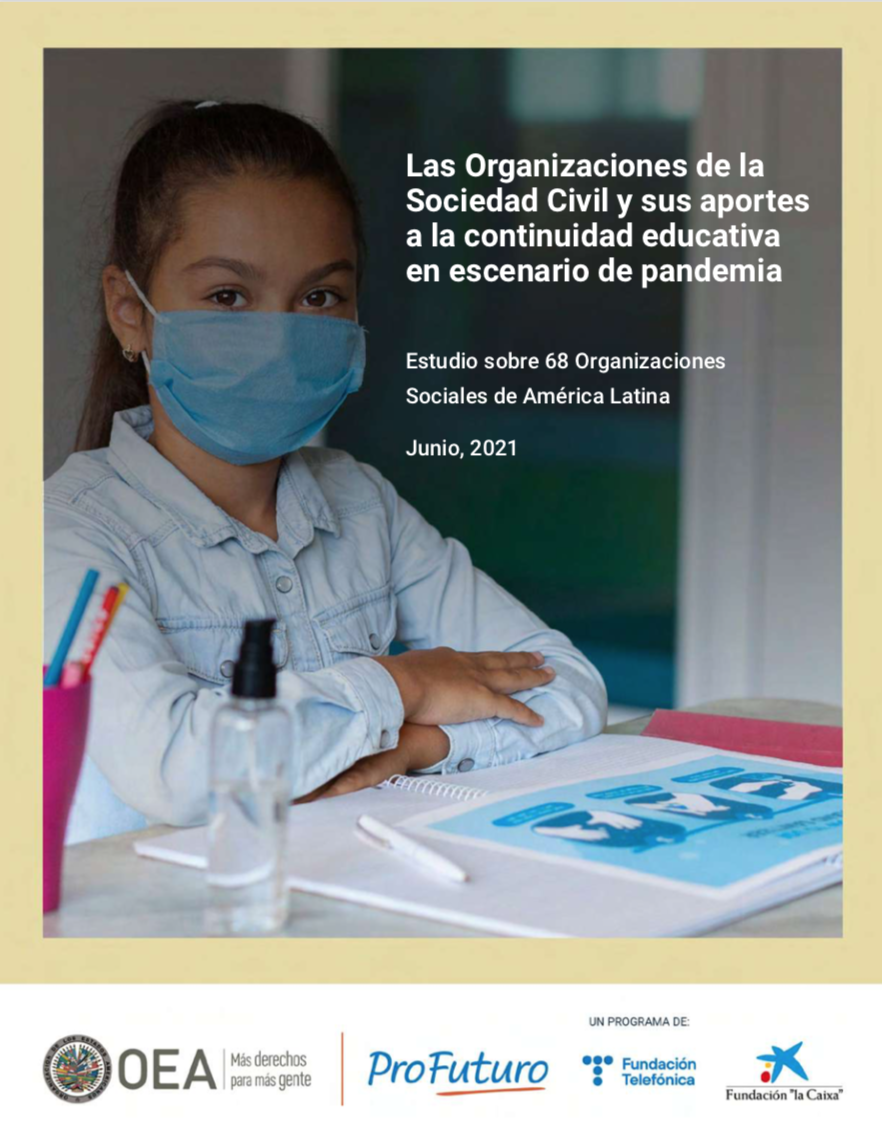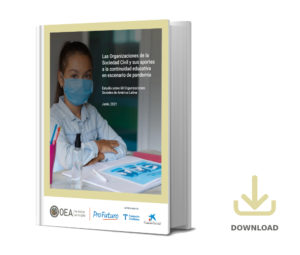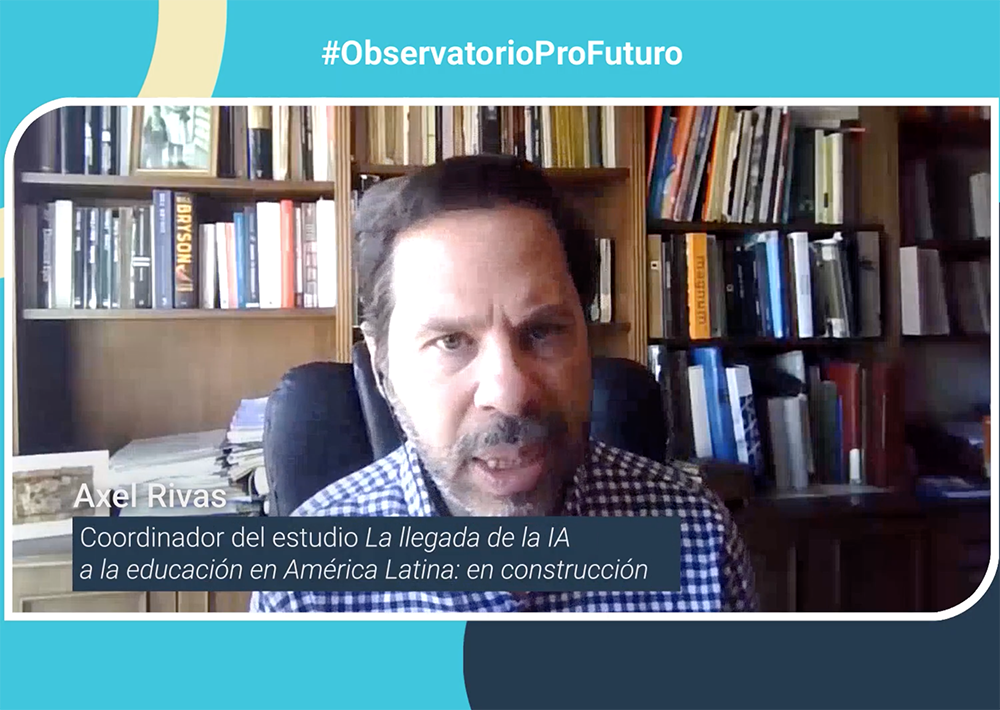Mobilising political dialogue based on civil society organisations, highlighting the value of the third sector and adding voices to the fight for the right of all children to high-quality education. These are some of the goals of the study titled Civil Society Organisations and their contributions to educational continuity in a pandemic scenario, jointly drawn up by the Organisation of American States (OAS) and ProFuturo. In this article the ProFuturo Observatory has sought to focus on one of its most relevant conclusions, namely the need to articulate partnerships between these organisations and other governmental, multilateral and private players in order to overcome the great challenges facing education in Latin America and the Caribbean.
In March 2020 around 114 million children and young people in Latin America and the Caribbean suddenly found themselves locked up indoors due to the pandemic. The effects that this has had in educational terms are disastrous and they’ve aggravated a situation which, despite the progress made, wasn’t healthy to begin with. For example, before the pandemic 51% of 15-year-old students (in other words, more than half) were low achievers in terms of reading, a figure more than double the one recorded in OECD countries (23%). Meanwhile, 62% of the poorest students aged 8 to 9 hadn’t fully understood basic mathematical concepts, compared to 25% of the wealthier ones. In terms of connectivity, according to the OECD, 40% of the students in the region don’t have access to a computer at home and more than half of the poorest children don’t have access to the internet.
The governments in the region responded to the emergency by developing regulatory frameworks and measures to guarantee remote education, including online platforms, radio and TV programmes, the development of materials, support for teachers, etc. However, the effectiveness of these measures has been limited by the large number and variety of challenges posed by a health, social and educational emergency of these proportions, as well as by the previous crisis situation faced by education in the most unequal region on the planet, even before the pandemic.
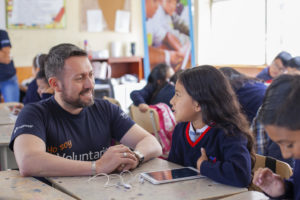
This framework of pre-pandemic and post-pandemic challenges easily transcends the individual capacity of the different players involved in the search for solutions to improve the educational situation of the most vulnerable students. We were alerted to the above by the Organisation of American States in its COVID-19 political action guide to combat the pandemic, in which it called for “broad dialogue involving all the sectors and reinforcing and promoting assertive mechanisms for political and social participation and deliberation in response to the crisis”. Moreover, the Incheon Declaration also recognises the participation of non-state players in the achievement of SDG 4 while stressing the states’ inescapable obligation as the main guarantors of the right to education (Cardini et al, 2021).
In this regard, as stated by UNESCO, civil society organisations (CSOs) are essential for educational communities when it comes to guaranteeing the right to high-quality education for all children. To explore this role further, the Organisation of American States (OAS) and the ProFuturo Foundation joined forces to conduct a study to analyse the role of these organisations and their contribution to the educational continuity within the context of the pandemic.
The research characterises these organisations and provides a descriptive analysis of their main contributions during the period. Studying their educational programmes, their functional structures and their work processes has yielded some highly interesting conclusions about their ability to articulate partnerships and help in the collective construction of effective educational responses based on public policy. We’ll see how below.
The benefits of CSOs
What advantages of these organisations can entities such as governments and multilateral organisations capitalise on? The following comparative benefits appear in the analysis performed in the study:
- They build from the ground up: CSOs bring their experience in the field to the analysis. Their direct work with communities adds an eminently practical vision to the diagnosis of the situation that needs to be harnessed. They have close contact with the regions they operate in, giving them contextualised knowledge of their needs, the key actors in each of them and the most appropriate action strategies for each situation.
- They generate contextualised knowledge, a factor that’s fundamental for the drawing up of public policies: Their years of daily practice and their in-depth knowledge of how each community and region works means that they have systematisation and knowledge-building capabilities that are crucial for the designing of programmes and policies.
- They create innovative pedagogical tools: They contribute to the creation of educational platforms and their contents, providing avenues for accompanying families, creating alternative forms of backing for students, offering socio-emotional support and suggesting mechanisms to enhance the dialogue between vulnerable communities or schools and national education authorities.
- They promote dialogue-based processes: Given their experience in the field and their close links with other sectors such as the corporate world, civil society, academia and multilateral organisations, CSOs position themselves as relevant players when it comes to promoting dialogue, adding perspectives and building consensus. They have an essential role to play in the local and regional education agendas.
- They enhance articulated work: CSOs are open organisations that structure and base their strategies on collaborative work and join up with other organisations and sectors to broaden their expertise. For example, according to the study, articulated work is present in 96.7% of the organisations that were surveyed. Moreover, one out of two takes part in areas of coordination with academic institutions and international organisations and four out of ten do so with the business sector and the government.
- They’re flexible: CSOs are more flexible than other organisations when it comes to adapting their internal processes, their programmes and their ways of operating to the needs of the current changing context. For example, 97% of the programmes were modified to allow for their implementation during the pandemic. They also adapted their resources and equipment.
Lessons learned a recommendations
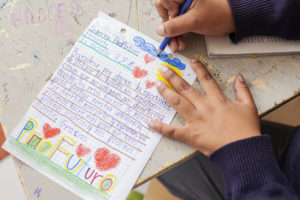
All these characteristics make CSOs key players that can contribute to decisions related to educational policy, so it’s important to include them in the policy dialogue in a systematised manner. In this respect, what can we do to optimise these comparative advantages and enhance their role in the shaping of effective public policies? The study offers a set of recommendations that are summarised below:
Systematising their learning and giving it greater visibility: If we want the experience of the CSOs on the ground and their differential value to form part of the public education agenda and the policy dialogue, we need to obtain a compilation of their experiences and the lessons learnt, including the processes, the actors involved, the difficulties encountered, the progress made and so on. The above can and should constitute a source of strategic consultation to provide information for the decisions relating to education policy.
Building areas of confluence between CSOs: This study has identified the presence of different partnerships that bring together educational CSOs in the region. These partnerships have been forged with the aim of implementing programmes in a collaborative manner and capitalising on their individual experiences to improve the quality of education in the region. Building areas of confluence where the networks and partnerships bringing together the CSOs in the region coincide will prevent the dispersion of efforts by steering and reinforcing their achievements and broadening their demands, thus contributing to the construction of a common regional education agenda.
Building a multi-sectoral education agenda: The pandemic has placed several educational issues in the region at the centre of the debate. We must make the most of the moment to address these challenges. This will involve drawing up an innovative, streamlined and collaborative educational agenda that builds on the lessons learnt from the actions taken by governments, CSOs, multilateral organisations and the private sector during the health crisis. This agenda should be based on the evidence built and the lessons learnt from the different studies conducted during the pandemic.
Enhancing articulation with multilateral organisations: CSOs, multilateral organisations and the public sector can mutually benefit from these partnerships. As the study indicates, CSOs offer innovative and field-tested interventions and flexibility to adapt and redesign strategies, while multilateral organisations can enhance the dissemination of the work of the CSOs and provide their technical expertise for the definition of action plans, objectives and goals.
Aligning priorities with the public sector: The vast majority of CSOs have cooperated with government institutions during the pandemic. In the study, 78.3% of the organisations stated that they had participated in dialogue roundtables and consultative events convened by governments’ educational bodies. Maintaining these channels of dialogue and partnerships in the long term will be highly desirable if the response to the major educational challenges in the region is to be continued, particularly in the most vulnerable contexts, in which CSOs also play an essential role that can be of great help to the public sector.
Throughout this article we’ve seen how Civil Society Organisations play an essential role in guaranteeing the right of all children in Latin America and the Caribbean to high-quality education. They’ve done so for years, although the pandemic has made their work even more visible. The health crisis has led to mutually beneficial work methods and partnerships for all the parties. The pandemic isn’t over, but, even if it were, we shouldn’t squander the lessons it has taught us. This study is an initial major step in that direction.
If you want to find out more about the role these organisations have played during the pandemic and what we’ve learnt from this experience, you can download the full study here.
References:
Cardini, A., Bergamaschi, A., Weyrauch, V. and Matovich, I. (2021). Multi-sectoral partnerships in education: a Latin American and Caribbean perspective. Inter-American Development Bank. Washington D.C.
ProFuturo and OAS. (2021). Civil Society Organisations and their contributions to educational continuity in a pandemic scenario. OAS and Fundación ProFuturo.
UNESCO. (2021). Non-formal education, sustainable development and the Education 2030 Agenda. UNESCO, Paris.



